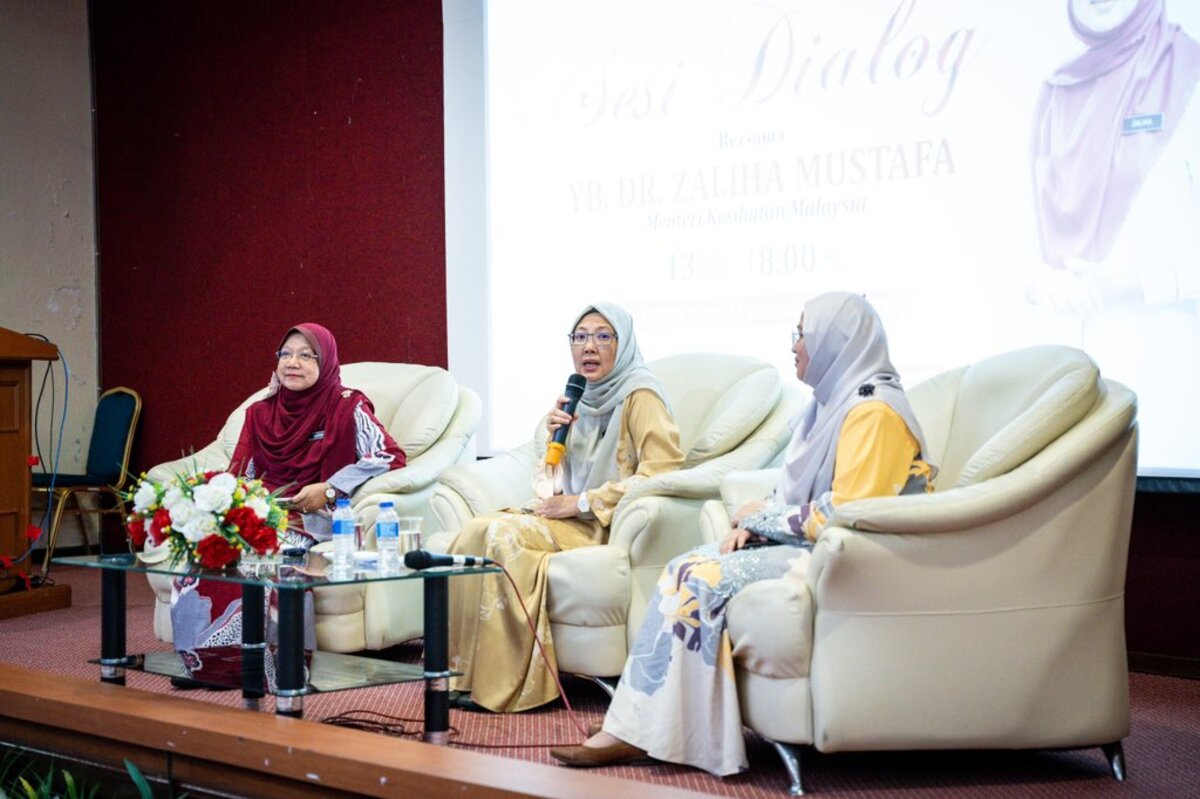KUALA LUMPUR, August 16 – The Malaysian Medical Association (MMA) commended Health Minister Dr Zaliha Mustafa today for holding town hall sessions with health care workers in the public sector.
The country’s largest doctors’ association highlighted Dr Zaliha’s dialogue last Sunday with medical, dental, and pharmacy officers at Sultanah Nur Zahirah Hospital in the Terengganu state capital of Kuala Terengganu.
“The inclusiveness demonstrated by the Health Ministry is indeed welcomed and appreciated,” MMA president Dr Muruga Raj Rajathurai said in a statement.
“Allowing opportunities for health care workers to openly express themselves and speak up on matters will be an effective means towards understanding the issues on the ground. Such open discussions can only improve the system and health care delivery for the people.
“Health care is all about central policy and local implementation, hence engaging with health care workers at every level should be an important follow-up step to take on the implementation of government policies.
“Having a team of advisors is, of course, important. However, these dialogue sessions can serve as a platform that will allow the health minister to get to the heart of the issues through direct feedback from health care workers in the various departments.”
MMA praised the health minister today, even though a town hall organised by MMA itself together with the Ministry of Health (MOH) six months ago last February yielded no results.
At the February town hall, government doctors had raised issues like their low on-call allowance rates (RM9 per hour on weekends) and salaries, the alleged exploitation of health care workers (including wage theft, bullying, and overwork), as well as opaque selection criteria for permanent positions for house and medical officers and for JUSA positions for specialist doctors.
None of these issues have been addressed to date. In fact, the very next day after the February 22 town hall, Dr Zaliha, in Parliament, defended the selection process for permanent positions in the public health service as “objective, fair, and transparent”.
Last June, the MOH defended the quantum of medical officers’ on-call allowance, even citing a fictional UD52 specialist doctor named Dr Ali who supposedly earns more than RM17,000 a month, an example which medical groups, including MMA, have denounced as unrealistic.
After the Terengganu town hall last August 13, Dr Zaliha did not announce any firm solutions, besides simply saying that issues like transfer claims for medical officers – specifically for those who relocated to Sabah and Sarawak – in the MOH’s relocation exercise of more than 4,100 doctors, and over 600 dentists and pharmacists were under discussions with the Ministry of Finance (MOF).
Costs for relocation from the Klang Valley to Sabah or Sarawak are estimated to be at least RM5,000 per person. The Galen Centre has estimated the relocation bill for all 4,700 health care professionals to be at least RM30 million.
The nationwide relocations of contract doctors, dentists, and pharmacists across the country (not just East Malaysia) were implemented at the same time as the date of effect of their permanent appointments last July 31, rendering these contract-turned-permanent medical, dental, and pharmacy officers ineligible for transfer claims.
The health minister also said she would raise to the Public Service Department (JPA) the issue of demotions of pharmacy and dental officers upon their permanent appointments.
Contract dentists and pharmacists have previously complained of demotions upon entering permanent service as their previous years under contract were not counted, leading to either lower salary increments or wage cuts due to the removal of allowances. These issues were highlighted by CodeBlue months ago in February and March.
Dr Zaliha further said, after the Terengganu town hall, that she would request the MOH’s Human Resource Division (BSM) to re-evaluate the maximum five-year contract for pharmacy officers.
She also expressed her desire to expand electronic medical records (EMR) across MOH health care facilities “as fast as possible”.
CodeBlue reported last February that the EMR system at Selayang Hospital – which was the first tertiary hospital in Malaysia, and even the world, to go fully paperless a quarter of a century ago in 1999 – has fallen into disrepair due to the lack of upgrades.








